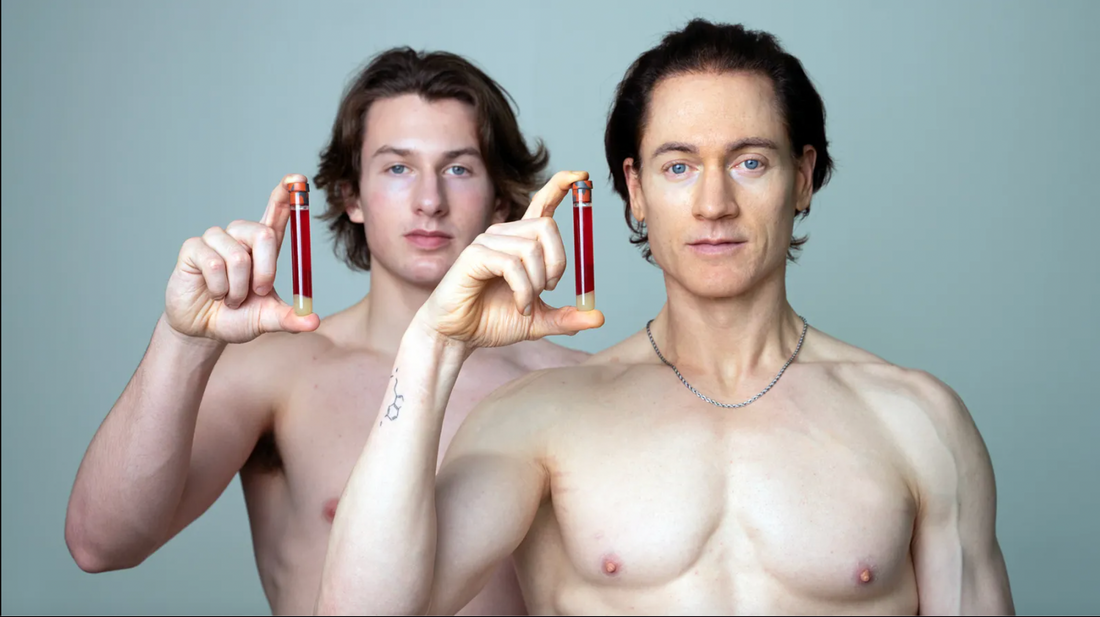Don't die!
If you are into longevity and biohacking, you might have heard of Bryan Johnson and his "Don't Die" Community and Blueprint protocol.
It might sound a bit crazy, but I personally admire what he is doing; through so many tests, treatments, and therapies, he is effectively acting as a human guinea pig for the benefit of others. His eagerness to freely share his experiences and findings is a great benefit to all of us and will help to pave the path for discoveries in lifespan and health optimisation. It is about improving science and information for everyone, not only about personal benefit for him. His commitment and bravery in pushing the limit of what is practical really inspire me.
Blueprint and Coffee Lovers:
If you’re a coffee lover, you’ve probably wondered why some health and wellness programs, like Blueprint diets or detox plans, leave coffee off the menu. After all, coffee is a daily ritual for millions of people worldwide, thanks to its rich flavour and caffeine boost. But there’s more to the story. Let’s break down why coffee is often excluded and what it means for you.
What’s the Deal with Caffeine?
The first big reason coffee gets the boot in many blueprints is its caffeine content. Caffeine is a natural stimulant that gives you that burst of energy, but it also comes with some drawbacks:
-
Sleep Disruption: Bryan Johnson talked about how he had sleep problems, part of his protocol was focused on achieving a consistent 100% sleep quality for a long period of time. In order to achieve that he had to cut out all stimulants, including caffeine. If you’ve ever had trouble sleeping after a late cup of coffee, you’re not alone. Even timing your caffeine can be tricky, as noted by resources like the Sleep Foundation. Your morning routine can have a huge impact on your sleep quality, waiting 90 to 120 minutes to have your first coffee in the morning can be the solution if you are not ready for a caffeine detox yet.
-
Dependency: Let’s face it—like Bryan Johnson, who has openly talked about how he becomes dependent when he is not controlling his caffeine intake, many of us also face the problem of too many coffees per day. Programs designed to reset your body often cut out caffeine to help break the cycle of dependency and start again with a healthier relation with the most potent natural stimulant out there.
If you’re still craving caffeine but want a smoother experience, try something like Original Power Coffee. It uses L-theanine to balance out caffeine’s effects so you can stay focused without the jitters. It also uses slow caffeine release, a technology that offers a longer, steady energy, cancelling the need for too many coffees a day as its effects last much longer than a usual coffee.
Why Does Coffee’s Acidity Matter?
Coffee is naturally acidic, with a pH between 4.85 and 5.10. That might not sound like a big deal, but it can create some challenges:
-
Digestive Issues: If you’ve ever felt heartburn or stomach discomfort after coffee, you know what I mean. The acidity can irritate your stomach lining.
-
Alkaline Diet Goals: Some programs, like those promoting alkaline diets, focus on balancing your body’s pH. Since coffee is acidic, it doesn’t make the cut in these plans.
If acidity is a concern for you, low-acid coffee options or blends like Original Power Coffee will likely be more moderate to low, as Arabica coffee (the primary source of caffeine) is known for being less acidic than other coffee types. The inclusion of MCT oil and functional mushrooms further buffers the acidity, giving the coffee a smoother, more balanced taste, which is easier on the stomach.
Does Coffee Dehydrate You?
You’ve probably heard that coffee is a diuretic, meaning it can make you pee more and potentially dehydrate you. While it’s not as extreme as some people think, it’s still something wellness programs consider.
-
Hydration Focus: Programs like Blueprint Digital emphasise staying hydrated, so they might cut coffee to encourage water intake.
-
Electrolyte Balance: Coffee can sometimes throw off your electrolytes, which these programs aim to keep in check. Keeping hydrated and having a balanced diet while not having more than the daily recommended caffeine intake is the solution to this concern.
What About the Extra Calories?
You might not drink your coffee black. Cream, sugar, and syrups can add up quickly, which is why many blueprints discourage coffee:
-
Hidden Calories: Those sweeteners and creamers can turn a low-calorie cup of coffee into a sugar bomb.
-
Artificial Ingredients: Many flaflavouredeamers and syrups are loaded with preservatives and sugars, which go against "clean eating" principles.
For a healthier option, blends like Original Power Coffee’s Smart Energy Blend encourage you to enjoy coffee without unnecessary additives, no added sugar, just a little stevia—a natural sweetener that even has health benefits.
Is Coffee Just Not for Everyone?
Not everyone reacts to coffee the same way, and some people are more sensitive to its effects:
-
Anxiety and Jitters: If you’re prone to anxiety, caffeine can sometimes make it worse; for those, it is especially important to time it well.
-
Increased Heart Rate: Some of us feel that racing heartbeat after just one cup, if you have blood pressure or any heart condition, it is important to talk to your doctor before consuming caffeine.
-
Digestive Issues: People with gastrointestinal problems should also talk to their doctors about alternatives, as it can impact their digestive system due to it's acidity and lead to discomfort.
Wellness programs often take a one-size-fits-all approach, which means cutting coffee entirely to avoid these potential issues for anyone who might be sensitive.
Encouraging Mindful Habits
At its core, excluding coffee from a blueprint is often about encouraging mindfulness. These programs aim to:
-
Break Habits: By cutting out stimulants, you’re encouraged to focus on improving your natural energy resources.
What About Coffee Alternatives?
After a reset, many programs recommend reintroducing coffee slowly and mindfully. If you’re looking for a clean, high-quality option, Original Power Coffee is a great choice. The blend focus on clean energy without the crash, combining ingredients like MCT oil, Lion’s Mane, and Chaga mushrooms for enhanced focus and wellness.
Conclusion
So, why does Blueprint exclude coffee? It’s all about promoting holistic health. By removing coffee, these programs address concerns like caffeine dependency, acidity, and additives, giving your body a chance to reset.
That doesn’t mean you have to give up coffee forever. Once you’re ready to reintroduce it, you can opt for high-quality, health-conscious options like Original Power Coffee to get the best of both worlds.
Relevant Links
- Caffeine, Natural Stimulant
-
Coffee has strong evidence for reducing all cause mortality - why does Blueprint exclude it?
-
A Blueprint for How Not to Measure Confusion: Coffee Case Study

